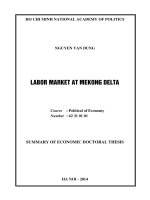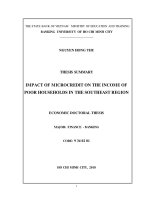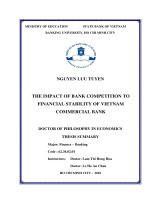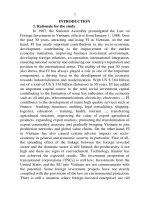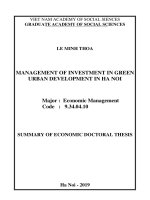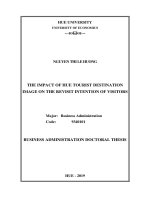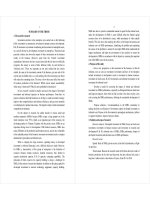Summary of Economic Doctoral thesis: The impact of diversification and competiton on the stability of commercial bank - A research in Vietnam
Bạn đang xem bản rút gọn của tài liệu. Xem và tải ngay bản đầy đủ của tài liệu tại đây (399.83 KB, 28 trang )
MINISTRY OF EDUCATION AND TRADING
UNIVERSITY OF ECONOMICS HO CHI MINH CITY
NGUYEN TU NHU
THE IMPACT OF DIVERSIFICATION AND
COMPETITON ON THE STABILITY OF
COMMERCIAL BANK: A RESEARCH IN VIETNAM
Major : Finance – Banking
Code: 93.40.201
SUMMARY OF ECONOMIC DOCTORAL THESIS
Ho Chi Minh City – 2019
The research was completed at:
University of Economics Ho Chi Minh City
Research Supervisors: Assoc.Prof.Ph.D. Tram Thi Xuan Huong
Assoc.Prof.Ph.D. Vo Xuan Vinh
Reviewer:
1.
2.
3.
The thesis will be defended at the Board of Examiners of
University of Economics Ho Chi Minh City
at…………………on……………………………
The thesis can be found at………………………………………
RESEARCHER’S PUBLICATIONS RELATED TO THE
THESIS
TT
Tên bài báo
Năm
Tên tạp chí
Ảnh hưởng của đa dạng
Banking Technology
hóa địa lý đến hiệu quả
1
kinh doanh của các ngân
2018
Review
hàng thương mại Việt
Volume 144 March,
Nam
2018
Nghiên cứu tác động của
2
cạnh tranh đến ổn định
của các ngân hàng thương
2018
Nghiên cứu Tài chính –
Marketing, tháng 4/2018
mại Việt Nam
The Impact of
competition on
3
diversification in
International Conference
2018
commercial banks: New
on Acounting and
Finance (ICOAF 2018)
evidence from Vietnam
Các yếu tố tác động đến
Conference on “Giải
sự ổn định của các
NHTM Việt Nam – Bài
4
học kinh nghiệm các ngân
hàng trên địa bàn
TP.HCM
pháp huy động nguồn
2018
lực nhằm phát huy cơ
chế đặc thù để đầu tư
phát triển kinh tế - xã
hội”, Sep 2018. HCMC
TT
Tên bài báo
Năm
Tên tạp chí
Board of Economy –
Budget and HCMC
Institute for
Development Studies.
ISBN: 978-604-971548-8.
Conference
on
“Vận
dụng cơ chế đặc thù để
phát triển và nâng cao
năng lực cạnh tranh
Đánh giá mức độ cạnh
doanh nghiệp TP. Hồ
tranh của hệ thống ngân
5
hàng thương mại Việt
Nam: Cách tiếp cận trong
thời kỳ hội nhập
2018
Chí Minh”, December
2018. HCMC Board of
Economy – Budget and
HCMC
Institute
Development
for
Studies..
ISBN:978-604-791-9963
1
CHAPTER 1: INTRODUCTION
1.1 The necessity of the research
Activities of banks affect the stability of monetary policy in
many countries directly. Facing challenges in intergration, most
countries in the world recognize that competition forces their
economies to grow. In order to improve the effectiveness of the
banks’competition strategies, it is necessary to diversify
business activities for limitting and diversifing risks and
increase the banks’ revenue.
However, there are many agruments about the impact of
competition and diversification on financial stability of banks’
perfromance. Whether competition and diversification pose a
threat to stability of banks or not? And how are all factors
considered in each statement or the environment where there
are different effects?
In Vietnam, in general, economic instability has caused
many losses to the banking system in all aspects. The levels of
competition among banks have become more intense. As a
result, commercial banks have been changing their operation by
expanding the scope of their activities to increase income.
However, bank costs and risks also increase and impact on
banking stability. So, should the bank swap this opportunity to
increase income and competition with its stability?
Be aware of the urgency of the impact of diversification and
competition on stability of bank, the thesis purposes to clarify
this problem. They are very practical, important objectives that
2
contribute to policies for comprehensive development and
stabilization of the banking system in the context of competition
and international integration. That is the reason why the author
chose the thesis "Impact of diversification and competition on
the stability of commercial bank: A research in Vietnam".
1.2 Research questions and objectives
Overview objectives: The main aim of the thesis is
evaluating the impact of diversification and competition on the
stability of the commercial banks in Vietnam. It is considered a
new evidence for suggesting the solutions to improve the
stability of banking system in Vietnam.
Specific objectives:
-
The impact of diversification on the stability of commercial
banks in Vietnam.
-
The impact of competition on the stability of commercial
banks in Vietnam.
-
The simultaneous impact of diversification and competition
on the stability of commercial banks in Vietnam..
-
Suggesting solutions for diversifying and competing to
increase Vietnamese commercial banks’ stability.
Research questions:
1. What are correlations betwwen diversification, competition
and stability of banks ?
2. How does diversification impact on Vietnamese commercial
banks’ stability?
3
3. How does competition impact on Vietnamese commercial
banks’stability?
4. How do diversification and competition impact on
Vietnamese commercial banks’ stability simultaneously?
5. What solutions are suggested to improve the stability of
commercial banks in Vietnam?
1.3 Subjects and scope of the study
Research subjects: The thesis focuses on diversification,
competition and stability of bank; Also, it examines the impact
of diversification and competition on banking stability.
Scope of the study: The thesis studies data of 28
commercial banks in Vietnam in the period of 2006 – 2017.
1.4 Research methodology: The thesis uses multivariate
regression model on the panel data and combines synthetic
methods with descriptive statistics.
1.5 The meanings of the thesis:
Firstly, through the study of the impact of diversification and
competition on banking stability, the thesis provides an
overview of relationship between the diversification and
competition on stability of bank.
Secondly, the study shows relationship of the diversification,
competition and banking stability of commercial banks in
Vietnam. This result contributes to the selection and
management of diversification strategy to help the dometic
banking system more stable.
4
Thirdly, identifying the importance of diversification and
using it as a special tool for planning strategy will help
Vietnamese commercial banks to build business activities,
including diversified stratergy. As a result, banks’ performance
become better.
In addition, based on the results of this research, bankers and
policymakers draw the necessary conclusions and policy
implications in the current economy. This contributes to
improve the commercial bank system and it will be more
effective, competitive and stable.
1.6 Structure of the thesis:
Chapter 1: Introdution
Chapter 2: Literature review
Chapter 3: Research methodology
Chapter 4: Results and discussion
Chapter 5: Conclusion and policy suggestions
CHAPTER 2: LITERATURE REVIEW
The chapter 2 presents literature review of stability,
competition and diversification in banks. Its objectives analyzes
concepts, charateristics and theories of above issues. Besides,
this chapter detailed previous research on the impact of
diversification, competition on banking stability. In the end of
the thesis, the author draws the research gaps.
5
2.1 Theory of economics
2.1.1 Theory of stability of economy
2.1.2 Theory of financial stability
2.2 Theory of banking stability
2.2.1 Stability in banks
The theory of financial stability is actually studies of
financial instability in the economy. Hyman P.Minskiy firstly
introduced the theory of financial instability by the concept of
"Minsky moment". It was the time when the economy was
changing from a stable to crisis state. The main reason of this
process was started from the economy, specifically from the
debt structure of financial system and attitude of investors in
creation, maintenance and bankruptcy of debt structure.
From the theory of financial stability, banking stability is
considered in terms of financial stability in banking operations.
It is “ the effective operation of the bank. The bank is able to
cope with the internal and external effects, both in the present
and future. Especially in the shocks of the economy, it still
remains solvency for the debts and maintains normal
operation".
Stability in
company
Theory of
Theory of
financial
financial
instability
stability
Stability in
Intermediary
financial
institution
6
2.2.2 The role of banking stability
The stability of financial system in general and banking
system in particular create a favorable business environment for
investors, protect depositors and encourage more and more
money to be converted and put into economy. The result is that
the process of operating money is also more effective.
Banking stability helps to increase the efficiency of financial
system, helps to promote the full functions of financial markets
and improves the distribution of resources.
Banking
stability
also
enhances
customers’
belief,
encourages them to send money, use services provided by banks
and reduces their habit of using cash.
Banking stability helps to minimize the costs of solving the
weaknesses of the financial system, enhances the efficiency of
economic policies and makes the macroeconomy more stable
and sustainable.
2.2.3 Factors
affecting
banking
stability:
bank
size,
profitability, credit risk, operating costs, revenue diversification,
payment ability, loans, competition, market share, elements
form the macroeconomy..
2.2.4 Measurement of banking stability
Mercieca et al (2007) proposed equation of estimating ZScore :
Z-score =
𝑅𝑂𝐴+
𝐸
𝑇𝐴
𝜎𝑅𝑂𝐴
7
With:
-
ROA : Net Return/Total assets.
-
E/TA: Equity/Total Asset
-
σROA : the standard deviation of ROA.
2.3 Competition in banking
2.3.1 Concept
- Competition is the objective rule of commodity production
which is the objective phenomenon of the market economy.
- The relationship between actors in the process of
competition is essentially economic.
- Competitive activity occurs on detailed cases but complies
with certain rules and regulations.
- Competition is more and more diversified.
2.3.2 The theory of competition:
The thesis introduces theories of competition including the
classical competition theory, neoclassical competition theory
and modern competitive theory.
2.3.3 Measurement of competiton in banks
Competitive characteristics in commercial banks:
- The competitive activities of commercial banks rely
heavily on the trust of customers for prestige and brand name of
the bank.
- Commercial banks have closed relationship with each
other.
- Competition between commercial banks is not weakened,
annexed or mutually exclusive.
8
- Banking activities take place in a wide range, in the region
and expand in many countries around the world.
- Competition of commercial banks is subject to supervision
and strict control of the central bank.
Measurement of competiton in banks:
Many indicators are used to measure the level of competition
of bank, such as the Lerner index, the H index, and the Boone
index. The thesis approaches the Lerner index.
Lerner index:
𝐿𝑒𝑟𝑛𝑒𝑟 𝐼𝑛𝑑𝑒𝑥 (𝐿) =
𝑃 − 𝑀𝐶
𝑃
P: Average output of bank, revenue/total assets (CarboValverde và cộng sự, 2005).
MC: Margin cost of bank, not be directly observed and be
estimated by total cost funtion.
𝑀𝐶𝑖𝑡 =
𝐶𝑜𝑠𝑡𝑖𝑡
𝑄𝑖𝑡
[β1 + β2 ln Qit + ∑3𝑘=1 𝛷k ln Wk,it + υ trendit]
- Costit : Total cost
- Qit : Output
- W1 : Cost of deposits
- W2 : Cost of labour
- W3 : Cost of capital
The higher the value Lerner is, the higher the value of the
bank is but competitive condition of economy is descreased.
9
2.4 Diversification in banking operations
2.4.1 Concept
Diversification is that state where bank focuses on creating a
wide range of products and services, expands its business scope
or expands its geographical scope (geodiversity) to create a
competitive advantage and increase income and profits for the
bank.
2.4.2 The theory of diversification in banking operation
The theory of diversification in bank comes from the theory
of financial diversification based on the analysis of costs and
benefits. By accelerating the launch of a range of new financial
services (Teece, 1982) and cross-selling of financial products
alongside traditional lending services, this has led to increasing
opportunities to raise bank’s income significantly. In addition,
diversification also reduces information asymmetry (Diamond,
1984 and Stein, 2002) and agent representation costs (Stulz,
1990) and increases efficiency of internal capital market in the
bank (Stein, 2002).
In addition to these positive effects, however, the
disadvantages of bank performance in diversification are also
clearly demonstrated (Mazur and Zhang, 2015). Diversification
also increases the disagreement in the relationship between
large and small shareholders in the bank (Stulz, 1990). On the
other hand, increasing the scope and size of the bank also
increases the cost of representation (Rajan et al., 2000)..
10
2.4.3 Forms of diversification in commercial bank
- Diversifying current products of the bank
- Geographic diversification
- Geographic diversification combined product diversifiaction
2.4.4 Revenue diversification in commercial bank
One of the indicators used to reflect that banking
diversification helps to increase income. Income diversification
is considered to be the best indicator that reflects the results of
diversification strategies. It is not a form of diversification in
the bank's operations (Acharya et al., 2006, Chiorazzo and
Salvini, 2008). Lepetit et al., 2008; Baele et al., 2007; Campa
and Kedia, 2002).
2.4.5
Measurement
of
revenue
diversification
in
commercial bank
Mercieca et al (2007) proposed Herfindahl Hirschmann
Index (HHI) to measure revenue diversification in each bank.
𝑁𝑂𝑁
2
𝑁𝐸𝑇
2
HHIREV = (𝑁𝐸𝑇𝑂𝑃) + (𝑁𝐸𝑇𝑂𝑃)
With:
NON
:
Non-interest
income,
including
fee
income,
commissions, other services and business activities.
NET
: Interst income
NETOP: Net income, calculated by: NON + NET.
This higher figure reflects the lower level of the
diversification in the bank
11
2.5 Theoretical framework on the impact of diversification
and competition on banking stability
2.5.1 Theoretical framework on the impact of diversification
on banking stability
Theory of financial intermediation implies that banks
increase their profitability associated with diversified activities.
As the bank expands on a wide range of products and services,
it will create more demand and thereby increase revenue for the
bank. In addition, banking activities spread to non-traditional
sectors because these activities are less sensitive to interest rate
fluctuations in the economy. Moreover, banks will look at their
capital, human and technological resources to make the
operation more effective and benefit to offset the costs incurred.
However, there is a mixed view that diversification does not
bring benefits to the bank and makes the bank more instable.
This argument analyzes the relative costs of increasing the
complexity of the bank that may not be offset by the benefits
orded by diversification. In addition, when income from nontraditional activities is correlated with interest rate fluctuations,
the ineffective operation of the portfolio will lead to banking
instability.
2.5.2 Theoretical framework on the impact of competition
on banking stability
Competition in the banking sector affects the ability of
access capital, and stability the financial sector and the
economy unclearly. From the standpoint of market power view
12
(Boyd and De Nicolo, 2005), high position in the market allows
banks to set higher lending rates. So there is an increased risk of
moral hazard and adverse selection because only companies
with high risk accept high interest rates and can also increase
the risk of obtianing return/capital in banks. There are two
opinions in previous studies on competition and banking
stability. One is argued that there is a negative relationship
between competition and bank stability, as high competition
reduces the market power of the bank and margin profits.
Therefore, it will increase the risk for the bank. Another one is
argued that the more competition leads to greater stability.
2.6 Overview of study
2.6.1 Overview of study on the impact of diversification on
banking stability
When studying the impact of diversification on banking
stability, there are two opposite views:
On the point of view that diversification really benefits the
bank, there were studies by Mohammed et al. (2016),
Mercieca et al. (2007), Lee et al. (2013), Mathuva (2015) ,
Fang and Van Lelyveld, 2014, Thilakaweera et al. (2016),
Elsas et al. (2009), Meslier et al. (2016), Curi et al. (2015),
Rossi et al. (2009).
On the point of view that diversification does not benefit and
can lead to the risk of banking business, there were studies
by Garcia-Kuhnert et al. (2013), Berger et al. (2010) ,
Acharya et al. (2006), Bõninghausen and Kõhler (2015),
13
Hayden et al. (2006), Gulmhussen et al. (2014), Vo Xuan
Vinh and Tran Thi Phuong Mai (2015), Ngo Thi Lien
Huong), Nguyen Thanh Phong (2011).
2.6.2 Overview of study on the impact of competition on
banking stability
There are many agruments on the impact of competition on
bank stability, including:
On the first view, competition not be supported: studies by
Berger et al. (2008), Boyd et al. (2009), Fu et al. (2014).
On the second view, competition
impacts on stability
positively: studies by Fiordelisi and Mare (2014), Jeon and Lim
(2013), Goetz (2017), Martinez-Miera and Repullo (2010),
Ariss (2010), Yeyati and Micco (2007), Fernandez and GarzaGarcia (2017), Agoraki et al. (2011), Schaeck et al. (2009), Liu
et al. (2012), Soedarmono and Tarazi (2016), Vo Xuan Vinh
and Dang Buu Kiem (2016).
2.6.3 Overview of study on the impact of diversification and
competition on banking stability
There are many studies that measure simultaneous influence
of the diversification and the competitition on bank. The thesis
finds prominent studies by Amidu and Wolfe (2014), Mensi and
Labidi (2015).
2.7 Research gaps
Firstly, the thesis provides an overview which clearly shows
the correlations of diversification and competition with the
stability of the bank.
14
Secondly, the thesis investigates the one-way relationship of
diversification, competition and banking stability in Vietnam.
Thirdly, in particular, the thesis focuses on the magnitude of
impacts of diversification on the relationship between
competition and banking stability in Vietnamese commercial
banks. Will competition depending on diversification as a
special catalyst push banks to sustainable levels? Do the
Vietnamese commercial banks really exploit the benefits of the
diversification, use them to promote the process of competition
and make banks more stable?
CHAPTER 3: METHODOLOGY
At the beginning of chapter 3, the author builds three
research models for whole research objectives. Next, this
chapter describes the variables in detail. Finally, based on the
results of previously empirical research, the author argues and
elaborates research hypothesis appropriately.
3.1 Research models
- Model estimates the impact of diversification on banking
stability:
Bankstabi,t = α0 + α1Bankstabi,t-1 + α2R-Divi,t + βj,Controli,t
+ βj,,Control’i,t + εi,t
-
Model estimates the impact of competition on banking
stability:
Bankstabi,t = α0 + α1Bankstabi,t-1 + α2Lerneri,t +
α3Lerneri,t2 + βj,Controli,t + βj,,Control’i,t + εi,t
15
-
Model
estimates
the
impact
of
diversification
and
competition on banking stability:
Bankstabi,t = α0 + α1Bankstabi,t-1 + α2R-Divi,t + α3Lerneri,t
+ α4Lerneri,t * R-Divi,t + βj,Controli,t + βj,,Control’i,t + εi,t
With :
Bankstab
: measures the banking stability, calculated as Zscore, ROA, ROE
R-Div
: measures the income diversification in banks.
Lerner
: measures the competition in banks
Control
: variables describe specific figures of each
(including: logarit of total assets, , growth rate of
total assets, loans/total assets, deposits/total)
Control’
: variables describe characteristics of the economy
that impact on banking stability (GDP, INF)
it
: bank i in year t
αj ( j = 0,2), βj, (j, = 1-4), βj’, (j,, = 1,2): regression coefficients
3.3 Research hypothesis
H1: Banks diversify will increase their stability.
H2: Banks compete will increase their stability
H3: As the bank simultaneously increases the level of
competition and promotes the diversification strategy, its
stability will increase.
H4: Bank size correlated with banking stability positively.
H5: Growth rate of total assets correlated with banking stability
positively.
16
H6: Loans/total assets correlated with banking stability
negatively
H7: Deposits correlated with banking stability positively
H8: The GDP has a positive impact on banking stability
H9: The inflation rate correlated with banking stability
negatively.
3.4 Research data
The thesis used unbalanced panel data of 28 Joint Stock
Commercial Banks in Vietnam for the period 2006-2017. All
data was collected from their audited financial statements and
annual reports. The GDP and INF were collects from the portal
of the General Statistics Office of Vietnam.
3.5 The tests using in the models
The author uses the tests related to the linear regression
model:
multi-collinear
verification,
self-correlation,
and
endogenous.
GMM method is used for finding default results (Lee et al,
2013; Amidu at el, 2013; Mensi and Labidi, 2015).
CHAPTER 4: RESULTS ANS DISCUSSION
Using linear regression with panel data and tests including
FEM, GLS, GMM, the thesis finds approxiate results of inpact
of divesification and competiton on stability in Vietnamese
commercial banks. The details results are presented in table
4.10
17
Bảng 4.10: Results of thesis
Variables
Hypothesis
Result
R-Div
+
+
Lerner
-
-
Lerner*Div
+
-
Size
+
-
Growth
+
+
Loans
+
0
Deposits
+
-
DGDP
+
+
INF
-
-
ROA
Dependent
ROE
variable –
Banking stability
Independent
variables
RARROA
RARROE
Source: Regression results of the research models
CHAPTER 5: CONCLUSION AND POLICY
SUGGESTIONS
5.1 Conclusion
The impact of diversification on banking stability: The
results of estimated model show that there are statistical impact
of
factors
on
banking
stability,
including:
income
diversification, natural logarithm of total assets, growth rate of
18
total assets loans/ total assets, deposits/total assets. These
results are the same with most previous studies.
The impact of competition on banking stability: The results
of the model show that the regression coefficients of lerner
index and control variables which are characteristic of the bank
are tested correctly. That reflects that the banks’ competitive
strategy has a positive impact on maintaining banking stability
in Vietnamese commercial banks.
The impact of the diversification in the relationship between
competition and banking stability: To answer the question that
whether diversification is really influencing positively on this
relationship, the thesis has conducted the test and the results
show that: In the process of competition, the banks selected
diversification strategy will negatively affect their stability. This
is an important empirical evidence to prove that Vietnamese
commercial banks will be more cautious in choosing the way to
diversify their portfolio in their competitive strategy.
5.2 Policy suggestions
Planning banking business strategy:
- Competition strategy: the bank needs to consolidate its
competitiveness, effectively manage its operating costs.
Managers need to have supportive policies that create a
effective environment to encourage banks’ investment in
order to strengthen their capabilities.
- Income diversification strategy: Banks should have a
strategy for planning their products and services to meet the
19
needs of their customers in the long time. In addition,
policymakers should focus on diversification in the
development policies of credit institutions which help to
develop banks’diversification
- The strategy of using diversification as a important mean for
increasing competition: banks should develop an integrated
strategy in which income diversification is part of the plan.
Besides, banks need to carry out other business strategies by
exploiting
their
resources
and
strength.
Based
on
accumulated experience and potentials, the bank will
accelerate their activities.
The structure of asset and equity: banks should develop
criteria for assessing the efficiency of using banks' capital in
all fields. Also, they find out the reasons for increasing their
assets is to meet the demand of the banks or profit. Besides,
it is important to review the credit quality of loans. In
addition, bank managers and executives also need to
promote and support commercial banks to deal with bad
debts to strengthen their financial system and avoid harming
the banking system.
The ability to face fluctuations from the economy: banks not
only need to develop policies to forecast well the changes of
the economy but also have active measures to cope with the
changes. In addition, managers and policymakers need to
maintain stability in the monetary market, control inflation,
and set up targets for managing credit growth of commercial
20
banks. Besides, it is necessary to closely monitor the
banking business, to grasp and direct the mergers and
acquisitions of banks in order to avoid cross-ownership
cases between banks that affect banking stability.
5.3
New contributions of the thesis:
The thesis "The impact of diversification and competition on
the stability of commercial banks: A research in Vietnam"
examines theories of banking stability, competition and
diversification in banking. Its goals focuse on the impact of
diversification,competition and the simultaneous impact of both
on banking stability in Vietnamese commercial banks in the
period 2006 - 2017. The results of the thesis bring important
academic and empirical contributions as follows:
Firstly, the thesis provides an overview of relationship of
diversification, competition and the stability of bank. In
particular, it shows the impact of income diversification on
banking stability and the effects of competition to banking
stability. Besides, it also considers the correlation of
diversification to the relationship of competition and banking
stability. That gives effective strategies for diversification as
well as competition in performance of banks.
Secondly, the thesis shows the positive correlation of
diversification, competition and stability of commercial banks
in Vietnam from 2006 to 2017. This result significantly
contributes to banks when they want to select and manage
21
strategies in diversification and competitive to help them more
stable.
Thirdly, the thesis considers the impact of diversification
and competition on banking stability in the Vietnamese
commercial banking system in order to identify the importance
of diversification and use it as a special tool in the process of
planning competition strategy. This will help Vietnamese
commercial banks build business directions in order to be more
stable, including diversification strategy.
The
research
results
confirm
the
importance
of
diversification, competition for banks’efficiency and stability.
Meanwhile, it implies significant implications for the
policymakers of banks and managers in the banking and
finance. Based on the results of this research, bankers and
policymakers have the necessary conclusions and policy
recommendations in the current economy that contribute to
stability of banking system
5.4
Research limitations and the next study suggestions
It is not possible to compare the degree of diversification,
competition and stability of Vietnamese commercial banks in
relation to some economies in the region. This is a significant
limitation of the thesis that influents to suggesting policy in the
context of globalization of the financial and monetary sector.
In addition, the thesis limits the review of the diversification
by bank's non-interest income and non-interest income. These
indicators do not reflect and measure all the activities of the
